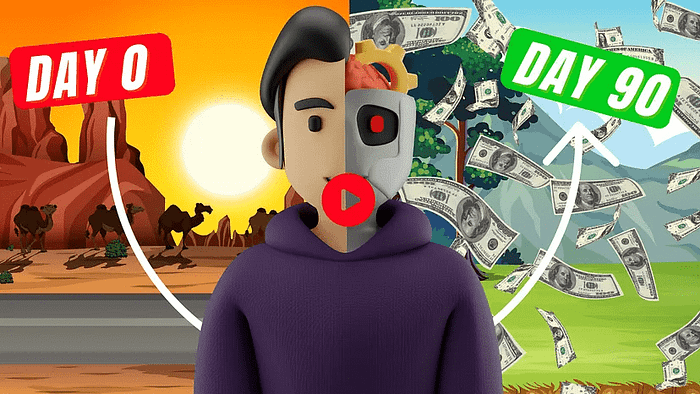How I’d Learn AI Agent Development in 2024 (If I Had to Start Over)
AI agent development is revolutionizing the tech landscape in 2024, and I’m here to share my journey into this exciting field.
As someone who’s been deeply immersed in the world of AI agents, I’ve witnessed firsthand how they’re reshaping industries and creating new opportunities.
From tech giants like Google to a wave of startups, companies are pivoting towards more advanced agent-based systems.
This shift is creating a surge in demand for skilled AI agent developers.
However, the path to becoming one isn’t always clear, given how new and rapidly evolving this field is.
That’s why I’ve decided to demystify the process and share my insights on how I’d approach learning AI agent development if I were starting from scratch in 2024.
In this comprehensive guide, I’ll break down who an AI agent developer is, what skills you need to become one, and provide you with a complete roadmap you can follow right now.
We strongly recommend that you check out our guide on how to take advantage of AI in today’s passive income economy.
Table of Contents
Understanding AI Agents
Before diving into the learning process, it’s crucial to grasp what AI agents really are.
Many influencers define them as either automations or virtual employees, but I find both these descriptions misleading.
AI agents occupy a unique space between these two concepts.
They have more autonomy than traditional automations, which run regardless of changing circumstances.
Yet, they have less autonomy than human employees, who can make independent decisions and even defy instructions.
The most accurate description I’ve encountered comes from Andre Karpathy, who likens AI agents to operating systems.
This analogy is apt because AI agents, like operating systems, have memory (RAM), access to tools, and can utilize other language models to reflect on their actions.
Understanding this concept is crucial for effective AI agent development.
It shapes how we approach building these agents and what we expect from them.
Many beginners make the mistake of trying to make their agents perform everything independently.
However, the key is to view your agent as a coordinator, routing user requests to the appropriate tools.
Think of it like your computer’s operating system, where different apps handle specific tasks.
Your role as an AI agent developer is to ensure your agents have access to all necessary resources and knowledge to perform their designated tasks effectively.
The Role of an AI Agent Developer
As an AI agent developer, your primary responsibility is to create reliable and efficient AI agents tailored to specific business processes.
This role involves several key aspects:
- Thorough Research: You need to deeply understand the business and determine what resources the agent will need to perform its tasks effectively.
- Tool Creation: Developing the necessary tools is crucial. These tools are what allow your agent to interact with the world and perform meaningful actions.
- Iteration and Feedback: AI agent development is an iterative process. You’ll need to constantly gather feedback from stakeholders and adjust your agent accordingly.
- Deployment and Integration: Finally, you must deploy your agents and integrate them seamlessly into your client’s business processes.
Essential Skills for AI Agent Development
To excel in AI agent development, you’ll need a combination of soft and hard skills.
On the soft skills side, strong communication is essential.
You’ll often find yourself gathering requirements from stakeholders and setting clear expectations, which can be challenging.
Additionally, an eagerness to learn is crucial in this rapidly evolving field.
As for hard skills, you’ll need a foundation in light backend development combined with AI knowledge.
Don’t worry if you’re starting from scratch – the field is so new that even a few months of dedicated learning can put you ahead of the curve.
The Coding Question: Is It Necessary?
A common question I encounter is whether coding is necessary for AI agent development or if no-code platforms will suffice.
In my experience, coding skills are indeed crucial for several reasons:
- Custom Tool Creation: The most powerful tools your agent will use often require coding experience. Even when connecting to off-the-shelf APIs, creating proxy endpoints gives you more control over tool behavior.
- Open Source Advantage: Open source projects often lead the way in creative AI applications. They can adapt to new advancements much faster than SaaS platforms.
- Data Privacy Concerns: Many clients prioritize data privacy and prefer to deploy agents on their own infrastructure, which requires coding knowledge.
While SaaS platforms will evolve, learning to code remains a non-negotiable skill for AI agent developers.
The good news is that with AI coding tools, the learning curve is much smoother now.
You don’t need to master complex data structures or algorithms – a high-level understanding is often sufficient, with AI tools handling much of the heavy lifting.
Starting Your AI Agent Development Journey
Step 1: Find a Good Project
The first and most crucial step in learning AI agent development is finding a compelling project.
This project will serve as your North Star, guiding your learning journey and helping you retain information more effectively.
The key is to find an intersection between AI and your personal interests.
This approach allows you to explore untapped use cases and create something truly unique.
For instance, if you’re passionate about music, you could create an AI agent that curates playlists, generates custom sounds, or even composes entire songs using various APIs.
To get started, scope out your initial project.
Define how many agents you want to create, what each agent will do, and what tools they’ll use.
Also, determine the overall goals and desired outcomes of your system.
This scoping process will give you a clear direction and help you stay focused throughout your learning journey.
Step 2: Set Up Your Development Environment
Your development environment is where you’ll spend most of your time, so it’s crucial to set it up correctly from the start.
Here’s what you need:
- IDE (Integrated Development Environment): Choose between popular options like Visual Studio Code, JetBrains, or Xcode. Each has its strengths, so pick one that feels comfortable to you.
- Python: Install Python, the most commonly used language for AI development. It’s beginner-friendly and powers much of the AI industry.
- Package Management: Learn to use package managers like pip or conda. Always create separate virtual environments for each project to avoid conflicts.
- AI Development Tools: Familiarize yourself with AI-powered coding assistants like GitHub Copilot, Cursor, or Amazon CodeWhisperer. These tools can significantly speed up your coding process.
Step 3: Learn the Basics
Start by learning Python programming basics.
Don’t worry about diving too deep initially – focus on understanding programming concepts at a high level.
Utilize online resources, tutorials, or even AI-powered learning assistants to guide you through this process.
A great approach is to clone a GitHub repository of an AI project you admire and go through it with an AI assistant.
Ask questions about specific lines of code you don’t understand and try to modify or add new features to the project.
This hands-on approach will help you grasp programming concepts more effectively.
Step 4: Master Git
Git is a crucial tool for version control and collaboration in software development.
As an AI agent developer, you’ll likely need to collaborate with client development teams, making Git proficiency essential.
Learn the basics of Git through online tutorials or AI-powered tools like GitHub Copilot CLI.
Understanding how to manage code versions, create branches, and collaborate with others will be invaluable in your AI agent development career.
Step 5: Dive into Modern AI Development Tech Stack
Once you’ve got a handle on the basics, it’s time to delve into the specific technologies used in AI agent development:
- LLM APIs: Start with OpenAI’s API, as it’s currently leading the field. Explore how to create a simple agent from scratch using only custom code and the API.
- Open Source Models: While commercial models often lead in capabilities, understanding open source models is crucial for scenarios requiring data privacy or custom deployments.
- Function Calling: This feature allows language models to interact with external functions, forming the backbone of how AI agents interact with the world. Explore libraries like Instructor, which combines Pydantic with function calls for input validation.
Step 6: Explore Multi-Agent Frameworks
Familiarize yourself with popular multi-agent frameworks like AutoGen, CrewAI, or AgencySwarm.
These frameworks handle underlying details like multi-agent communication and state management.
Each framework has its strengths, so explore a few to find one that aligns with your project needs and learning style.
Step 7: Learn Backend API Development
Many aspiring AI agent developers skip this crucial step, but deploying your agents in production is essential.
Learn to create serverless functions using platforms like Firebase, AWS Lambda, or your own server with Flask or FastAPI.
This knowledge will allow you to scale your AI agents efficiently and integrate them into real-world applications.
Step 8: Integrate and Deploy
Once you’ve built and deployed your agent as an API, try integrating it into communication platforms like Slack or Discord.
For an extra challenge, create a custom chat interface using platforms like Vercel.
This step will give you practical experience in making your AI agents accessible and user-friendly.
Monetizing Your AI Agent Development Skills
The final step in your AI agent development journey is learning how to monetize your skills.
This isn’t just about making money – it’s one of the best ways to continue learning and improving.
Here are three main avenues to explore:
- Freelance Platforms: Sites like Upwork offer a quick way to find clients without significant time or money investment. AI agent development is still a niche skill on these platforms, giving you a competitive edge.
- Cold Outreach: While more time-consuming, reaching out directly to companies can lead to higher-paying clients. Always aim to schedule a call rather than trying to sell your services via email.
- Full-Time Positions: Many companies, especially well-funded startups, are actively seeking AI agent developers. Keep an eye on job boards and networking platforms for these opportunities.
Remember, the goal at this stage is not just to make money but to gain real-world experience and continue learning.
Building Your Community
As a bonus tip, consider building your own community around AI agent development.
While it requires a significant time investment, having a community allows you to understand the needs and challenges of potential clients intimately.
This insight can help you tailor your services more effectively and provide valuable feedback for your growth.
Consider platforms like Twitter, YouTube, or even starting your own open-source project with a dedicated Discord server.
Growing an audience takes time, but the long-term benefits in terms of opportunities and learning are immeasurable.
Conclusion
Embarking on a journey into AI agent development in 2024 is an exciting and potentially rewarding endeavor.
By following this roadmap – from finding your niche project to monetizing your skills – you’ll be well-equipped to navigate this rapidly evolving field.
Remember, the key to success in AI agent development lies in continuous learning, practical application, and staying adaptable to new advancements.
As you progress, you’ll not only develop technical skills but also gain invaluable insights into how AI is reshaping businesses across industries.
So, take that first step, start your project, and dive into the fascinating world of AI agent development.
The future of AI is being written now, and you have the opportunity to be one of its authors.
Frequently Asked Questions:
How to build agent AI?
Building agent AI involves several key steps:
- Define the agent’s purpose and goals.
- Choose an appropriate AI framework or platform.
- Design the agent’s architecture, including perception, reasoning, and action components.
- Implement the agent’s knowledge base and decision-making algorithms.
- Develop or integrate necessary tools and APIs.
- Train the agent using relevant data and scenarios.
- Test and iterate to improve performance.
- Deploy the agent in its intended environment.
- Continuously monitor and update the agent based on feedback and new data.
Remember, AI agent development is an iterative process that requires ongoing refinement and adaptation to achieve optimal performance.
What is the AI development process?
The AI development process typically follows these stages:
- Problem Definition: Clearly identify the issue you’re trying to solve with AI.
- Data Collection and Preparation: Gather and preprocess relevant data.
- Algorithm Selection: Choose appropriate AI algorithms or models.
- Model Training: Use the prepared data to train your AI model.
- Model Evaluation: Test the model’s performance and accuracy.
- Hyperparameter Tuning: Optimize the model’s parameters for better results.
- Deployment: Integrate the AI model into the target environment or application.
- Monitoring and Maintenance: Continuously monitor performance and update as needed.
- Scaling: Expand the AI solution to handle larger datasets or more complex tasks.
This process is often cyclical, with feedback from later stages informing improvements in earlier stages.
What are the 5 types of agents in AI?
The five main types of agents in AI are:
- Simple Reflex Agents: These agents act based on the current perception of their environment, ignoring past experiences.
- Model-Based Reflex Agents: These agents maintain an internal state to track aspects of their environment that are not currently visible.
- Goal-Based Agents: These agents work towards predefined goals, choosing actions that will lead to the desired outcome.
- Utility-Based Agents: These agents make decisions based on a utility function that measures the desirability of different states.
- Learning Agents: These agents can improve their performance over time through experience and adaptation.
Each type of agent has its strengths and is suited for different types of tasks in AI agent development.
What is AI-assisted development?
AI-assisted development refers to the use of artificial intelligence tools to aid in the software development process. Key aspects include:
- Code Generation: AI tools can suggest or automatically generate code snippets based on context and intent.
- Code Completion: AI assists developers by predicting and suggesting completions for code as it’s being written.
- Bug Detection and Fixing: AI can identify potential bugs and suggest fixes, often before the code is even run.
- Code Refactoring: AI can suggest improvements to code structure and readability.
- Natural Language to Code: Some AI tools can convert natural language descriptions into functional code.
- Testing Assistance: AI can generate test cases and help automate the testing process.
- Documentation Generation: AI can help create and maintain code documentation.
- Performance Optimization: AI can analyze code and suggest optimizations for better performance.
AI-assisted development aims to increase programmer productivity, reduce errors, and improve code quality. However, it’s important to note that these tools are assistants, not replacements for skilled developers. Human oversight and decision-making remain crucial in the development process.

We strongly recommend that you check out our guide on how to take advantage of AI in today’s passive income economy.




